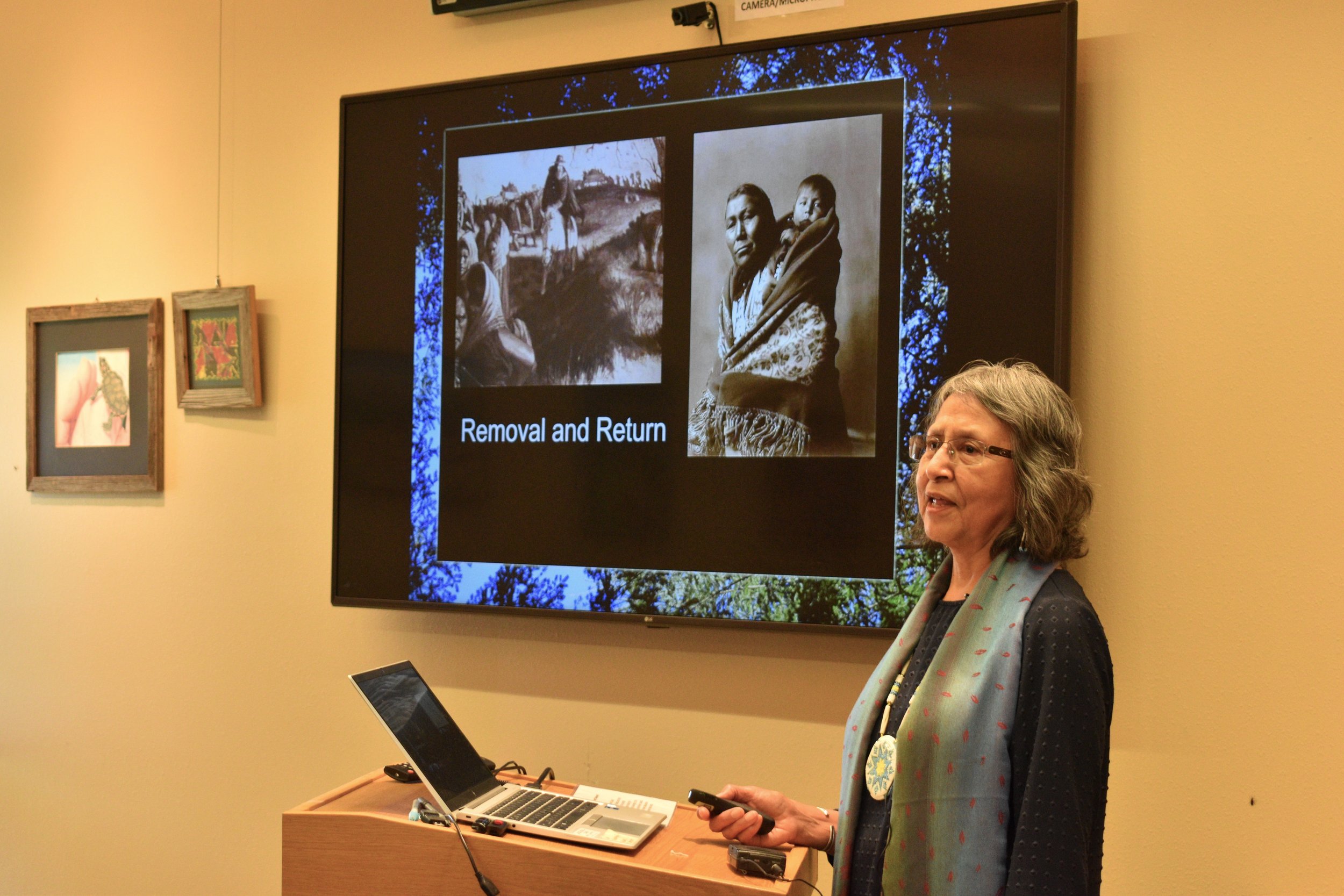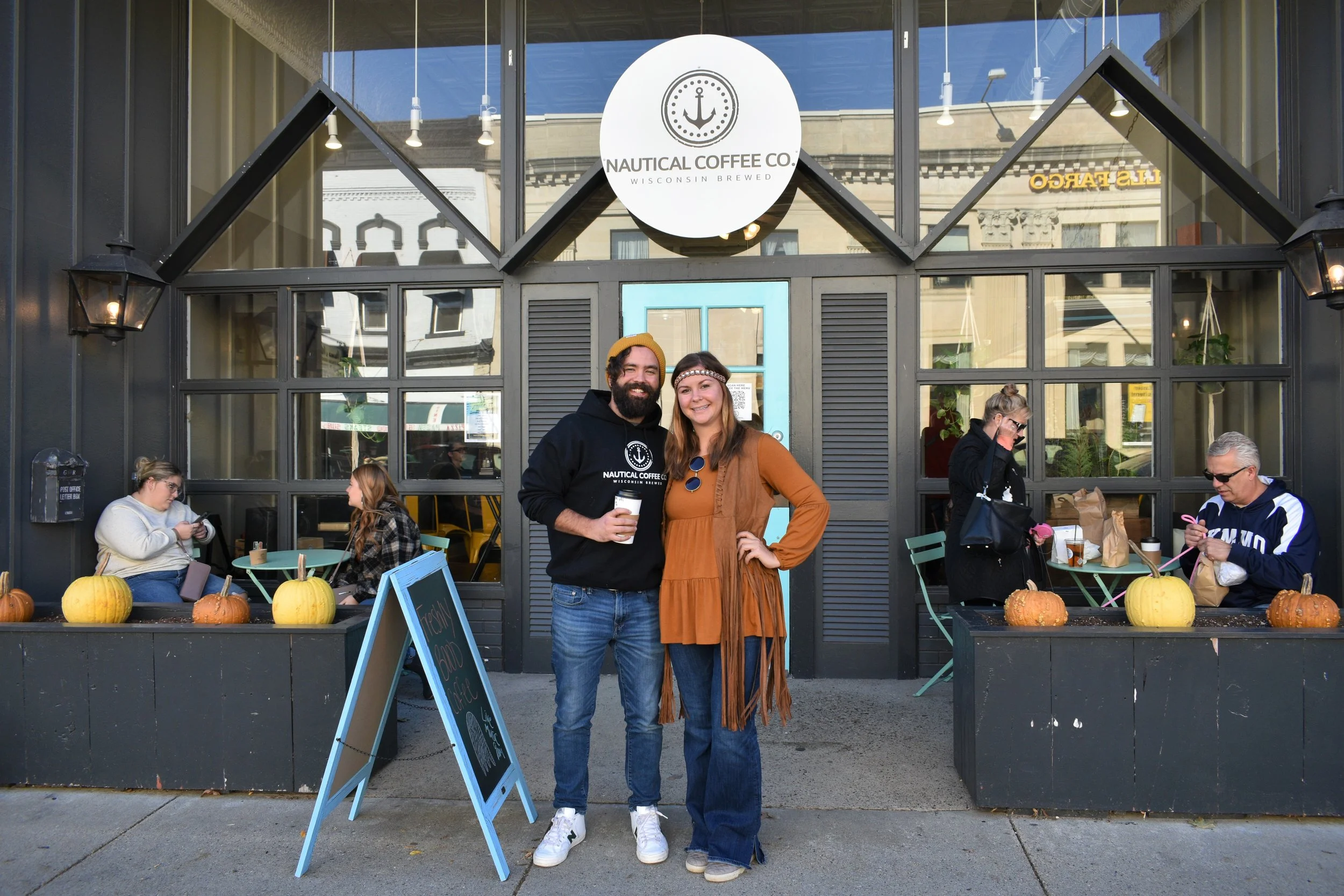Senior Academic Librarian-Emerita, Hoocąk Janice Rice, speaks at Kickapoo Valley Reserve on culture, philosophy, teachings, values, and land stewardship
“The way that I learned was from my grandmother and my mother. A lot of what we were told was to be quiet, to sit there, to listen and to work. We listened to what our elders told us and we also obeyed whatever they told us to do,” said Hoocąk (Ho-Chunk) tribal and Bear Clan member Janice Rice. “Fire to me, represents that campfire of the home setting and just being around outdoors, sitting around the campfire. Even you and some of your families when you're outdoors in summertime, in the evening you have a fireplace. It's a chance for you to reconnect with your own family, your generations, and all the relatives and friends who talk together and share stories, family stories and values. In the same way, that's what our Hoocąk people did. The fire represents the place where our women relatives cooked and centered the family and gathered around the fireplace. To me, it represents the role that we as a women have in our families. To bring our food to the fireplace, cook it and serve the family. It's a chance for all of us as we center ourselves around the fireplace, to really be aware of who we are, our family, our kinship system, and all those nice feelings that we get by knowing who we are and where we're from.” These were just a few things Rice shared with an audience on October 15th.
Rice was the featured speaker in October for the Kickapoo Valley Reserve’s (KVR) Driftless Dialogue series. Driftless Dialogue is a monthly presentation series covering a wide range of topics relating to the Kickapoo Valley people, history, or natural surroundings, and funded through a grant from the Ralph E. Nuzum Kickapoo Reforestation Fund through the UW-Madison College of Agricultural & Life Sciences, the Friends of the Kickapoo Valley Reserve, and supported by Badger Talks.
Rice’s talk titled, “Walk with Me Among My Homelands: Hear the Echoes of My Ancestors”, focused on Hoocąk removals, treaties signed with the tribe, different chiefs and their roles in both, cultural beliefs, inter-tribal relations, kinship, language preservation, and her tribe’s tenacity and ability to adapt, survive, and travel back to their homelands in Wisconsin. “It's fun to do, maybe because of my teaching background. I never got to be the elementary school teacher. I'm certified for K through six. At the University I taught library instruction to English 100 and Com Arts 100 to those classes.” Rice has also taught in law schools for American Indian Studies classes.
Senior Academic Librarian-Emerita Rice’s focus is, and always will be on: American Indian resources, literature, culture, history, language preservation & revitalization, but most importantly, being Hoocąk.
She received her bachelor’s degree in Education, with an area of concentration in American Indian Studies, from the University of Wisconsin-Milwaukee. She also received her Master of Library Science (MLS) & MLS Advanced degree in American Indian Librarianship from the University of Wisconsin-Madison. In 2009, she received the Women of Color in Education Award from UW-Madison & the UW-System.
Passionate about education and educating others, Rice noted that growing up, learning was not only encouraged, but a way of life. She recalled the influence of her paternal grandmother and her mother saying, “It goes back my grandmother’s values, but my mother was really strong too. I remember coming home from school, and my mother made school life important. She always asked how school was and if I needed anything. If I had an assignment, I always told her what my assignment was. If there was extra that was needed, she would make sure I had it. So, when I went back to school the next day my assignments were complete.” It was the simple things she said that made the difference in her education growing up and not “big lofty ideas on education”. Rice said it was encouraging and made her want to do her best.
Whether speaking at KVR, a university, or civic groups, Rice said speaking and educating is important to her because she shares stories that people don’t hear every day about Hoocąk history. “I always base the speech on what the audience wants.” Rice noted that she likes to speak on the environment and her connection with it from a Hoocąk cultural perspective.
During her career as a librarian, Rice said her focus was on what children would learn, what children were focused on. A lot of the books she promoted way back, were really more children's literature. Part of her area of concentration as an educator and in her bachelor's degree, and then in librarianship, she focused on school librarianship that covered Indian history and Indian culture. She said that in the past there were books being written by non-natives about Native American culture that seemed to fuel myths and stereotypes. That has changed over the years thanks to efforts like those of Louise Erdrich (an enrolled member of the Turtle Mountain Band of Chippewa Indians) who owns Birch Bark Books in the Twin Cities, Minnesota, that promotes books written by Indian authors.
Editor’s note: Ordinarily, I would elaborate more on the content of someone’s speech or talk. In this instance, I honor Janice Rice with respect, not telling her stories, as they are hers and those of the Hoocąk. It is not my history or upbringing to tell. A history that needs to be shared to educate and dispel myths and stereotypes. I encourage our readership to watch the attached video of her talk at the Kickapoo Valley Reserve.





